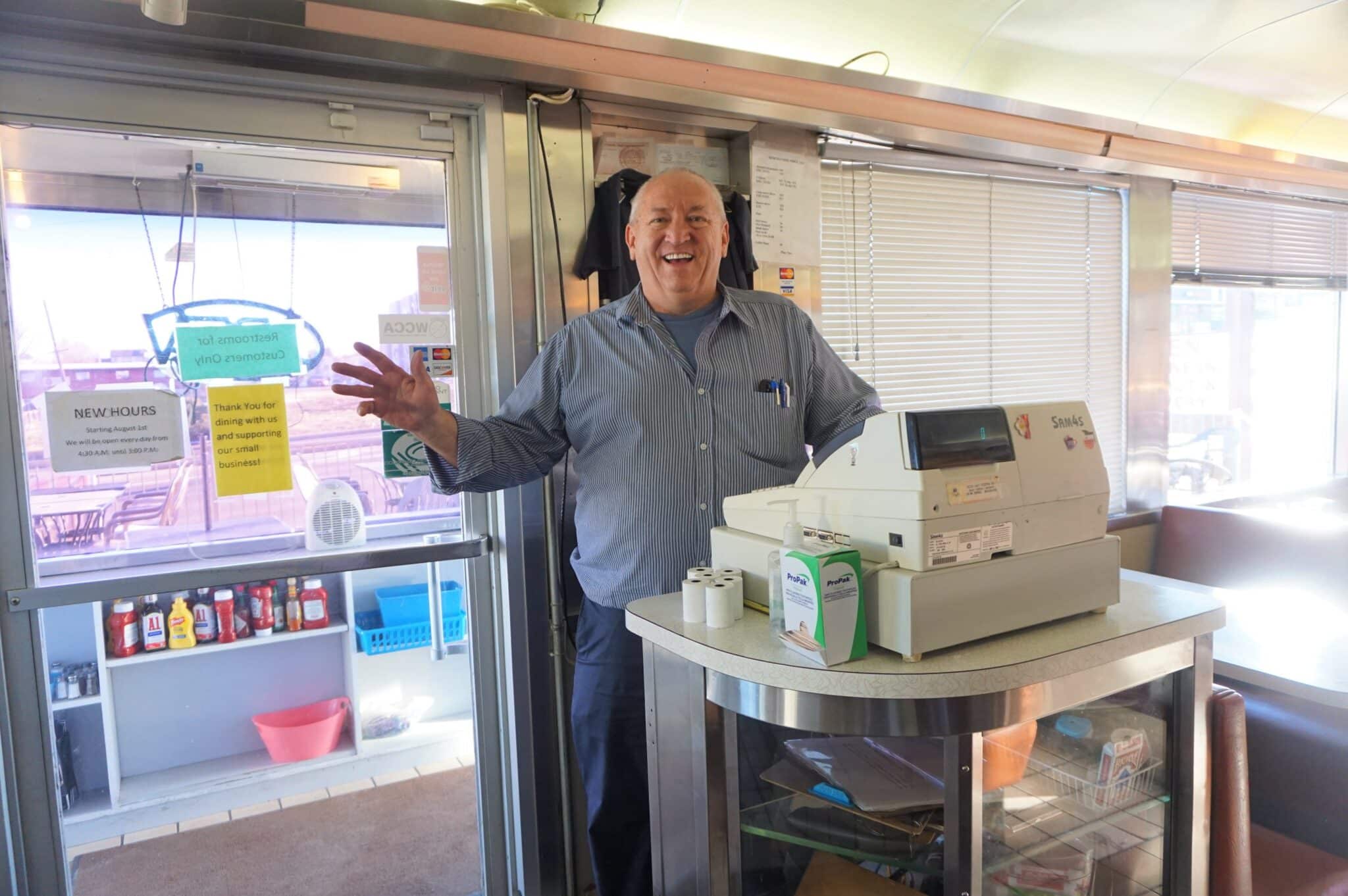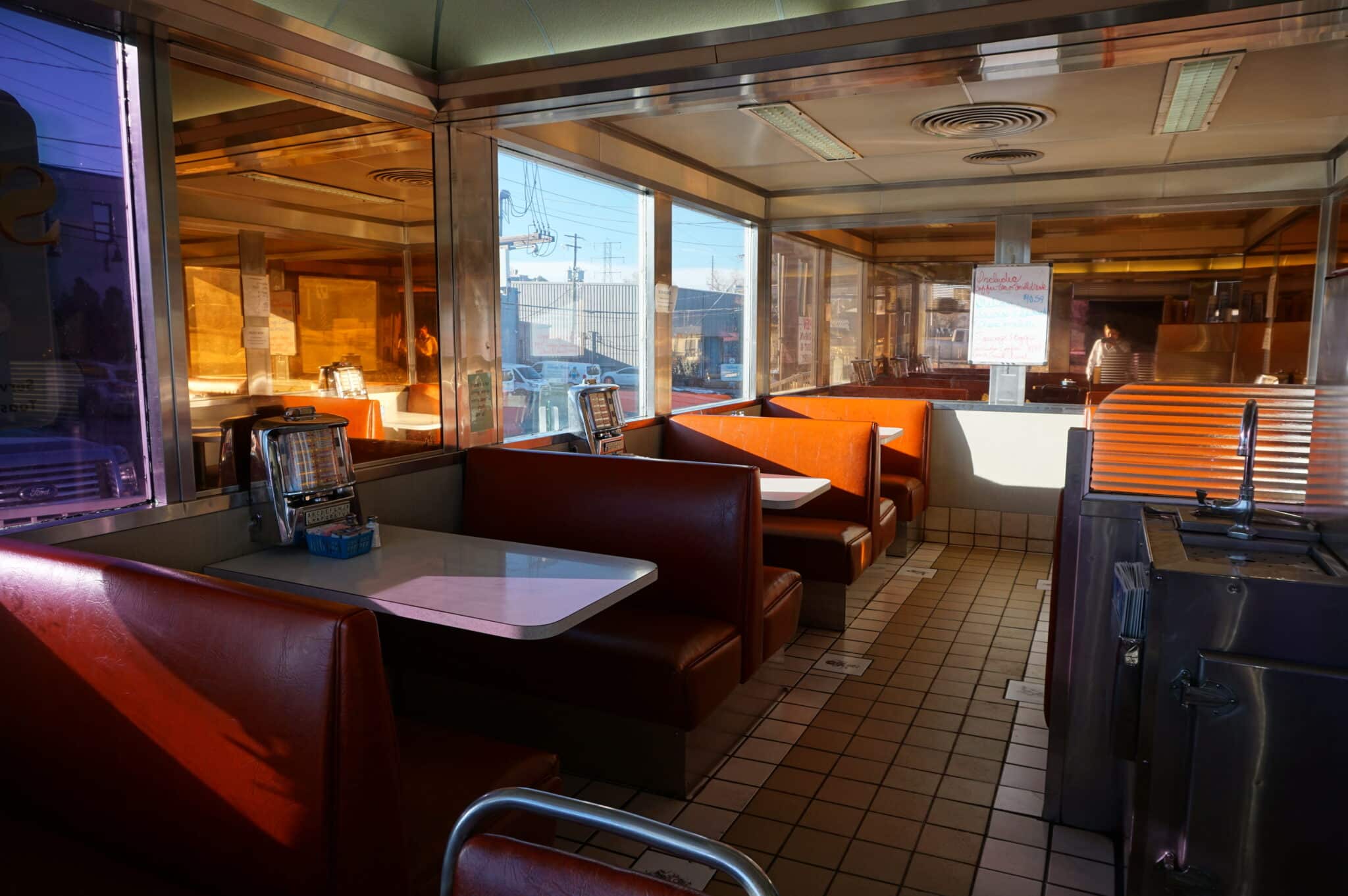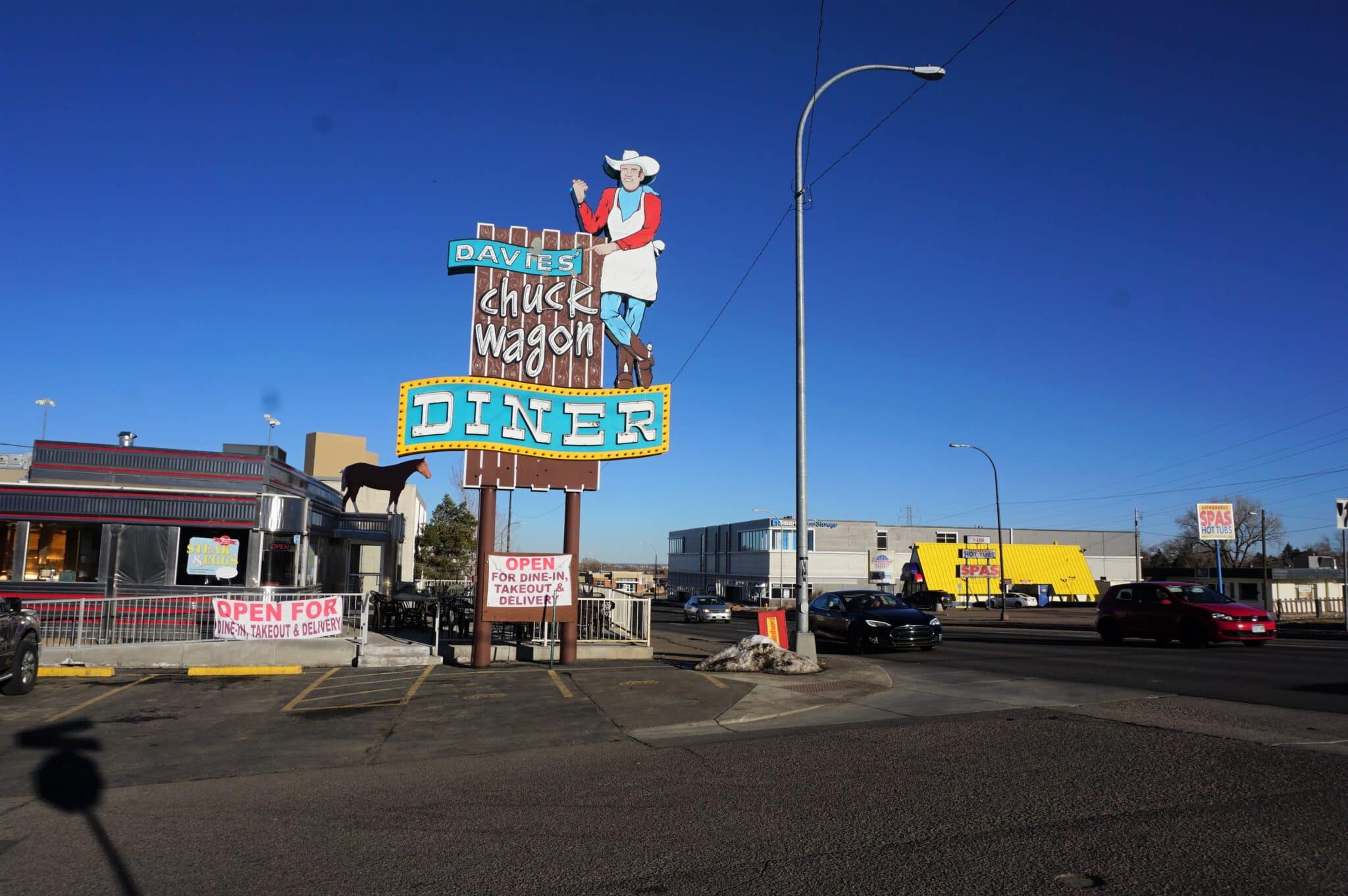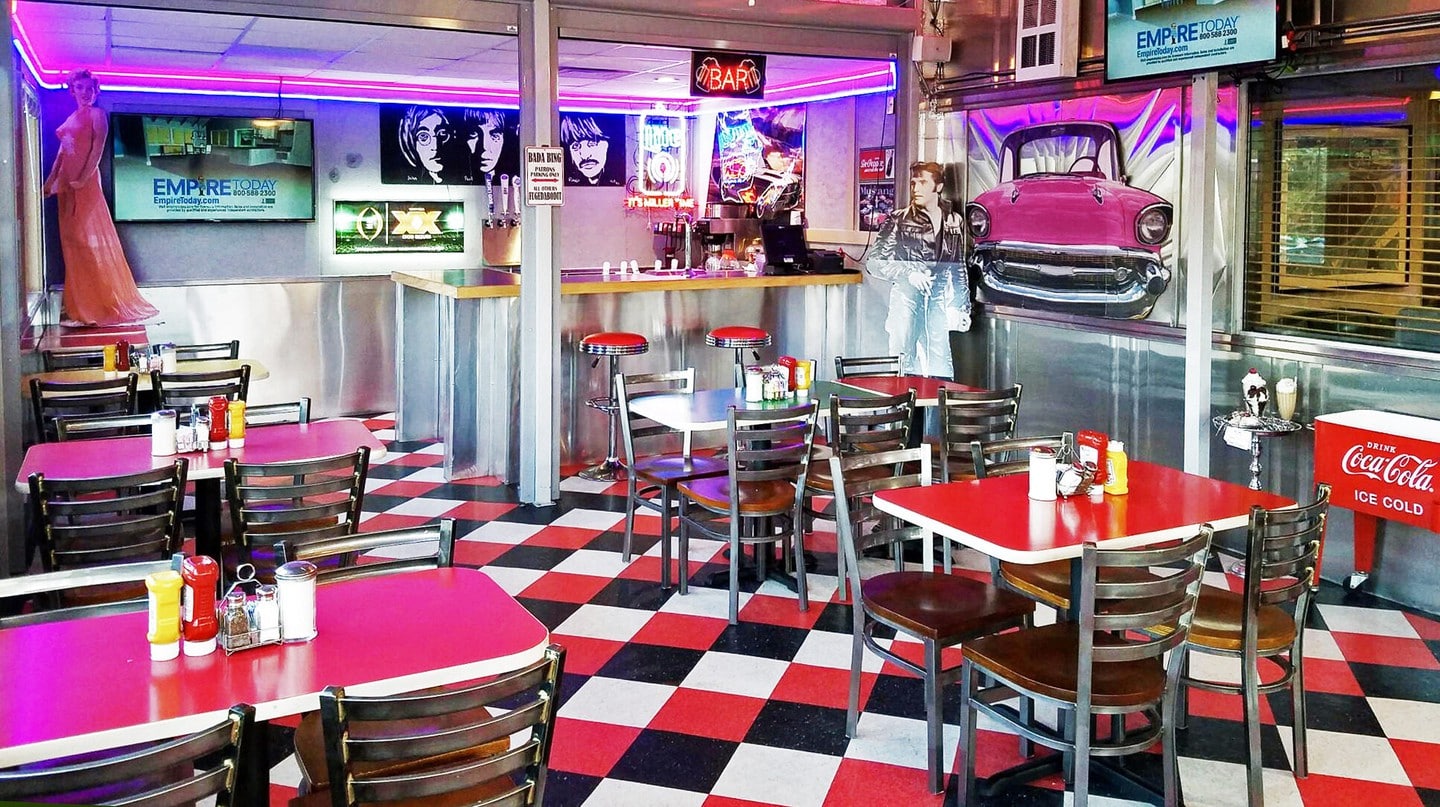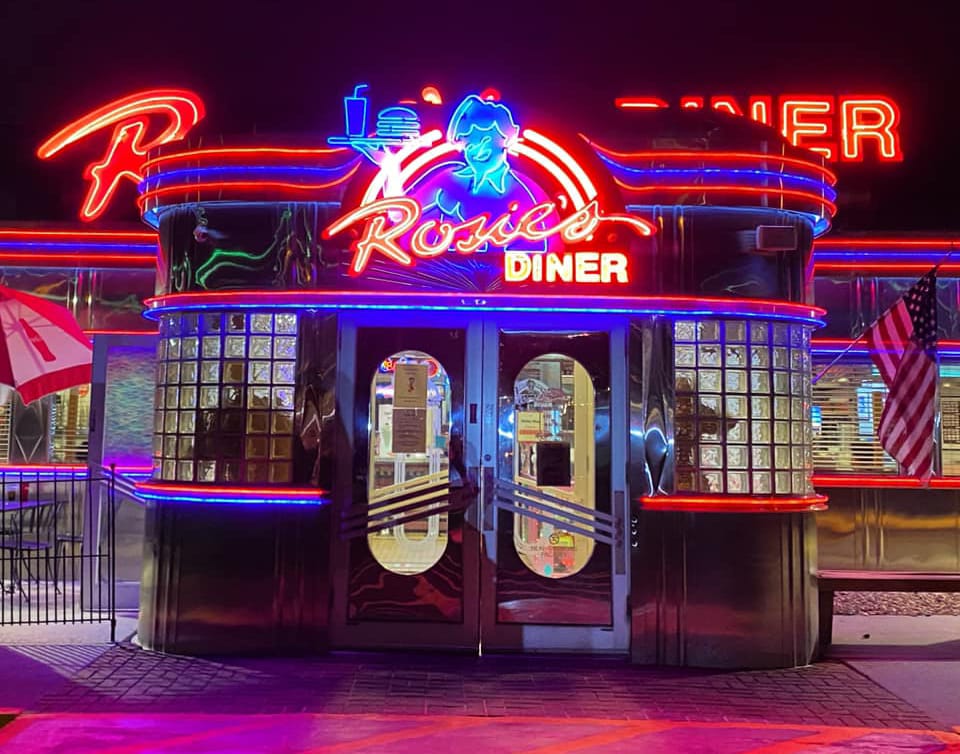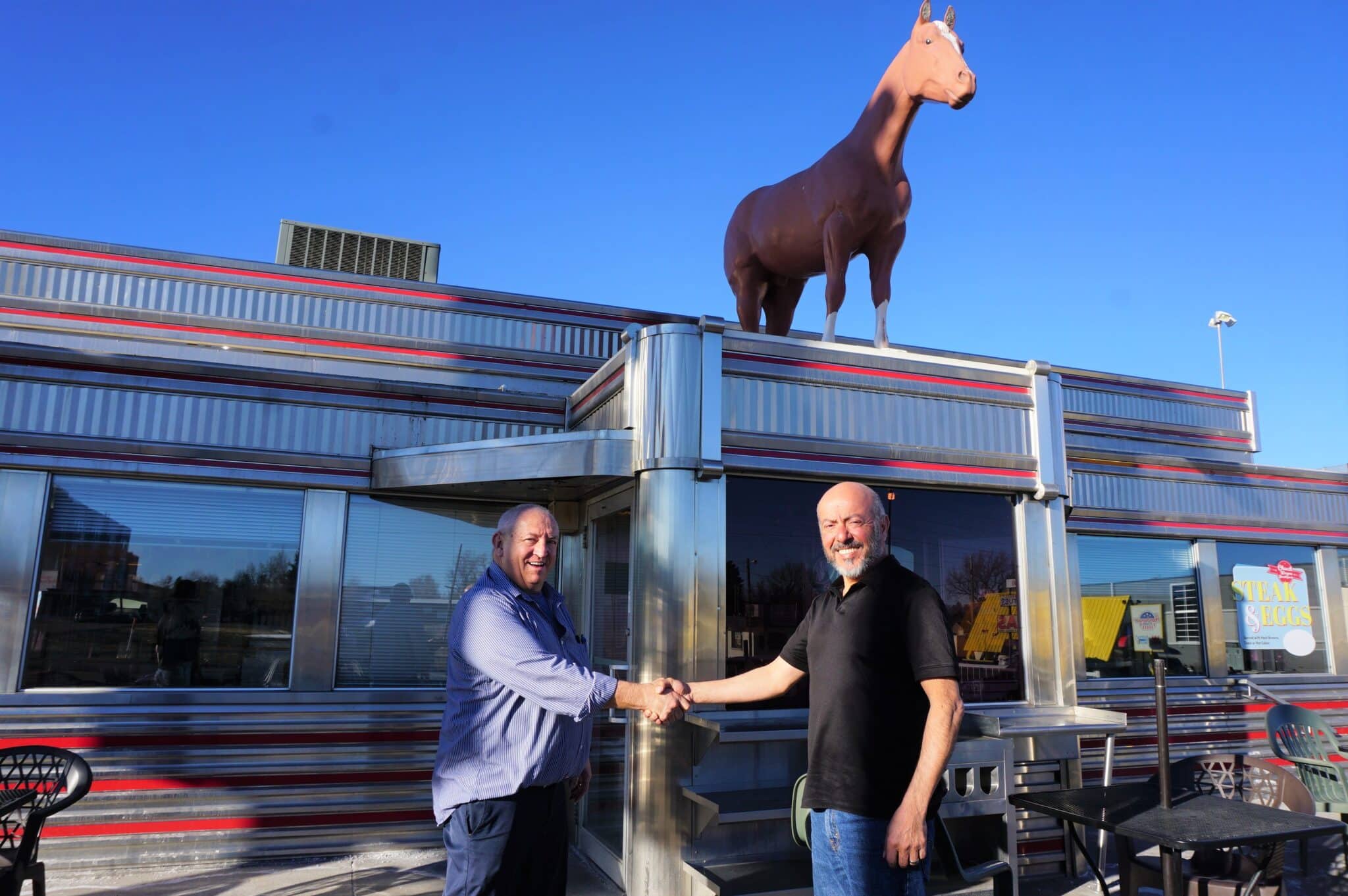
Davies’ Chuck Wagon Diner’s former owner Dwayne Clark, left, made a deal to sell the business and property to Sam Dehghani, owner of Rosie’s Diner in Aurora. (Lily O’Neill photos)
Dwayne Clark bought Davies’ Chuck Wagon Diner when he was just 21 years old in 1984.
But after 38 years, working seven days a week, the 59-year-old Denver native is ready to relax.
“My wife Tammy and I didn’t take a vacation for the first 12 years we owned the place,” Clark said. “Now, we’re going to go visit our son and his family in Florida and my wife’s mom in Arizona.”
“We won’t have to worry about payroll, ordering, the cooler or if they cleaned the snow off the sidewalk,” he continued. “It’ll be different because I did this every day for almost 40 years. But I hope it’s a good different.”
This week, Clark sold Davies’ Chuck Wagon Diner at 9495 W. Colfax Ave. in Lakewood to Sam Dehghani, the owner of Rosie’s Diner in Aurora, for $1.1 million, he said.
Davies’ Chuck Wagon Diner was built in New Jersey, the diner capital of the world, and shipped to Colorado in 1957. The 2,500-square-foot, cowboy-themed diner was one of the last models offered by Mount View, which provided the construction materials and plans for hundreds of diners across the country from 1939 to 1957.
The first owner, William Lyman Davies, sold it when his health began to decline in 1977. Davies erected the monstrous fiberglass brown horse that still sits atop the restaurant in 1962, when Clark was still a baby. And Clayton Lee, the second owner, sold it to Clark in 1984 after moving to another state.
Clark said he bought the business, and later the property in 1993, for a total of $250,000, with the help of his father, who operated a chain of Clark’s Coffee Shops around Denver. There, he met his wife Tammy, who was a waitress, and the two have co-managed the diner ever since.
In 1997, the diner was inducted into the National Historic Registry.
“Funny thing is, I’ve had the diner longer than any of the other owners combined,” Clark said.
When the pandemic hit, and shut down the diner for a number of days, the idea of retirement became more enticing to Clark.
“The pandemic took the fun out of the diner business and put doubt in my head that this could happen again,” he said.
In February last year, he put the diner on the market for $1.4 million.
For the last 38 years, Clark has been coming in every day at 4 a.m. and staying until close at 3 p.m. with his wife Tammy. He’s known as “boss” by his employees and “coach” by the local high school students, who he coached football.
Clark said 75 percent of their customers were regulars. They’ve had employees with them for 20 years, whose kids have grown up to work for them, longtime customers who have passed away, and even actors stop by for some steak and eggs.
A closeup shot of Davies’ Chuck Wagon Diner appeared in the 2021 Super Bowl Jeep ad narrated by Bruce Springsteen, and Dennis Quaid filmed some scenes inside the diner for the 1997 thriller “Switchback.”
“The historic nature of this place brings people back to the good ‘ol days,” Clark said. “It’s a staple in the community and has stood the test of time, whether good or bad.”
Clark hasn’t shed a tear yet but said the baton pass is hitting his wife Tammy harder.
“The customers are what made the place,” Clark said. “My wife has been crying over the last two weeks because she says it’s hard not to cry when you see a grown man cry who is going to miss us.”
Clark said he hopes his regulars will stick around for the new owner.
“Sam already owns a diner and understands the nostalgia of a diner and what customer service means to the community you’re taking care of,” Clark said.
From one diner owner to another
Dehghani was also considering retirement before the opportunity to purchase Davies’ came across his desk.
The 57-year-old, who has owned Rosie’s Diner since 2008, learned about the property through a mutual friend of Clark’s. He wasn’t originally aware of its history, but when he discovered this “diamond in the rough, I saw the potential,” he said.
“This wasn’t part of my plan. But when it came up, I got a good feeling,” Dehghani said. “It’s something we can manage much easier than a new concept.”
Dehghani doesn’t want to scare loyal customers and employees away with any drastic renovations. He has no plans to change the name or exterior of the property to uphold its landmark status, and he will keep Clark’s staff of 17.
But he does want to “bring the place back to its original glory,” he said. Over the next six months, he wants to complete subtle changes, such as adding neon lights throughout the diner, recovering the old orange booths, reviving the broken table jukeboxes, and hanging some historical photos on the wall, like a photo from “Switchback.”
Dehghani also wants to tweak the menu with some similar items at Rosie’s, like the fried Twinkie, more milkshakes and entree options.
“We want it to look like as sparkly and new as it did when it first opened in 1950, but we’re not rushing anything,” he said.
Dehghani purchased the 1950s-themed Rosie’s Diner at 14061 E. Iliff Ave. in Aurora for $900,000 in 2008, according to property records.
“Everybody collects something, and this was the start of my collection,” Dehghani said.
Like Davies’, the old-school diner was also built in New Jersey by Paramount Dining Car Company, one of the last diner manufacturers in the country, and transferred here on a flatbed truck in 2000.
Rosie’s Diner is named after a character from a long-running series of Bounty commercials that were filmed in a diner called The Silver Dollar Diner in New Jersey. The Silver Dollar Diner was later renamed after the character in 1970, and moved to Michigan in 1991 before closing in 2011.
This Aurora location was one of two trademarked replicas of the original in Colorado. The other is located in Monument.
Dehghani, originally from Iran, moved to Colorado in 1988 and went to school at Colorado State University. He worked at a Village Inn and iHop during and after college, where he learned how the diner business operates. One of the Village Inn cooks that trained him actually now works as a cook at Davies’.
He also had an affinity for the old-school culture after watching a variety of Mafia movies and TV shows, like “The Sopranos,” which sets its last scene in a diner.
Over the last 14 years, he’s updated Rosie’s to give it a real 1950s feel with cutouts of Marilyn Monroe and Elvis Presley, souvenirs that hark back to the era, revived jukeboxes and, soon, he’s going to add a Cadillac outside for photos.
“When I bought it in 2008, my wife thought I was an idiot,” he said. “ But 14 years later, I’m a genius.”
And despite his initial retirement consideration, Dehghani said he “still has plenty of gas left in the tank,” and hopes to leave the diners to his kids.
Other changes in the local diner scene include the closure of Breakfast King in the Overland neighborhood in January, as well as Nick’s Cafe in Lakewood, which announced last week it would be closing its doors on March 10 after 36 years.

Davies’ Chuck Wagon Diner’s former owner Dwayne Clark, left, made a deal to sell the business and property to Sam Dehghani, owner of Rosie’s Diner in Aurora. (Lily O’Neill photos)
Dwayne Clark bought Davies’ Chuck Wagon Diner when he was just 21 years old in 1984.
But after 38 years, working seven days a week, the 59-year-old Denver native is ready to relax.
“My wife Tammy and I didn’t take a vacation for the first 12 years we owned the place,” Clark said. “Now, we’re going to go visit our son and his family in Florida and my wife’s mom in Arizona.”
“We won’t have to worry about payroll, ordering, the cooler or if they cleaned the snow off the sidewalk,” he continued. “It’ll be different because I did this every day for almost 40 years. But I hope it’s a good different.”
This week, Clark sold Davies’ Chuck Wagon Diner at 9495 W. Colfax Ave. in Lakewood to Sam Dehghani, the owner of Rosie’s Diner in Aurora, for $1.1 million, he said.
Davies’ Chuck Wagon Diner was built in New Jersey, the diner capital of the world, and shipped to Colorado in 1957. The 2,500-square-foot, cowboy-themed diner was one of the last models offered by Mount View, which provided the construction materials and plans for hundreds of diners across the country from 1939 to 1957.
The first owner, William Lyman Davies, sold it when his health began to decline in 1977. Davies erected the monstrous fiberglass brown horse that still sits atop the restaurant in 1962, when Clark was still a baby. And Clayton Lee, the second owner, sold it to Clark in 1984 after moving to another state.
Clark said he bought the business, and later the property in 1993, for a total of $250,000, with the help of his father, who operated a chain of Clark’s Coffee Shops around Denver. There, he met his wife Tammy, who was a waitress, and the two have co-managed the diner ever since.
In 1997, the diner was inducted into the National Historic Registry.
“Funny thing is, I’ve had the diner longer than any of the other owners combined,” Clark said.
When the pandemic hit, and shut down the diner for a number of days, the idea of retirement became more enticing to Clark.
“The pandemic took the fun out of the diner business and put doubt in my head that this could happen again,” he said.
In February last year, he put the diner on the market for $1.4 million.
For the last 38 years, Clark has been coming in every day at 4 a.m. and staying until close at 3 p.m. with his wife Tammy. He’s known as “boss” by his employees and “coach” by the local high school students, who he coached football.
Clark said 75 percent of their customers were regulars. They’ve had employees with them for 20 years, whose kids have grown up to work for them, longtime customers who have passed away, and even actors stop by for some steak and eggs.
A closeup shot of Davies’ Chuck Wagon Diner appeared in the 2021 Super Bowl Jeep ad narrated by Bruce Springsteen, and Dennis Quaid filmed some scenes inside the diner for the 1997 thriller “Switchback.”
“The historic nature of this place brings people back to the good ‘ol days,” Clark said. “It’s a staple in the community and has stood the test of time, whether good or bad.”
Clark hasn’t shed a tear yet but said the baton pass is hitting his wife Tammy harder.
“The customers are what made the place,” Clark said. “My wife has been crying over the last two weeks because she says it’s hard not to cry when you see a grown man cry who is going to miss us.”
Clark said he hopes his regulars will stick around for the new owner.
“Sam already owns a diner and understands the nostalgia of a diner and what customer service means to the community you’re taking care of,” Clark said.
From one diner owner to another
Dehghani was also considering retirement before the opportunity to purchase Davies’ came across his desk.
The 57-year-old, who has owned Rosie’s Diner since 2008, learned about the property through a mutual friend of Clark’s. He wasn’t originally aware of its history, but when he discovered this “diamond in the rough, I saw the potential,” he said.
“This wasn’t part of my plan. But when it came up, I got a good feeling,” Dehghani said. “It’s something we can manage much easier than a new concept.”
Dehghani doesn’t want to scare loyal customers and employees away with any drastic renovations. He has no plans to change the name or exterior of the property to uphold its landmark status, and he will keep Clark’s staff of 17.
But he does want to “bring the place back to its original glory,” he said. Over the next six months, he wants to complete subtle changes, such as adding neon lights throughout the diner, recovering the old orange booths, reviving the broken table jukeboxes, and hanging some historical photos on the wall, like a photo from “Switchback.”
Dehghani also wants to tweak the menu with some similar items at Rosie’s, like the fried Twinkie, more milkshakes and entree options.
“We want it to look like as sparkly and new as it did when it first opened in 1950, but we’re not rushing anything,” he said.
Dehghani purchased the 1950s-themed Rosie’s Diner at 14061 E. Iliff Ave. in Aurora for $900,000 in 2008, according to property records.
“Everybody collects something, and this was the start of my collection,” Dehghani said.
Like Davies’, the old-school diner was also built in New Jersey by Paramount Dining Car Company, one of the last diner manufacturers in the country, and transferred here on a flatbed truck in 2000.
Rosie’s Diner is named after a character from a long-running series of Bounty commercials that were filmed in a diner called The Silver Dollar Diner in New Jersey. The Silver Dollar Diner was later renamed after the character in 1970, and moved to Michigan in 1991 before closing in 2011.
This Aurora location was one of two trademarked replicas of the original in Colorado. The other is located in Monument.
Dehghani, originally from Iran, moved to Colorado in 1988 and went to school at Colorado State University. He worked at a Village Inn and iHop during and after college, where he learned how the diner business operates. One of the Village Inn cooks that trained him actually now works as a cook at Davies’.
He also had an affinity for the old-school culture after watching a variety of Mafia movies and TV shows, like “The Sopranos,” which sets its last scene in a diner.
Over the last 14 years, he’s updated Rosie’s to give it a real 1950s feel with cutouts of Marilyn Monroe and Elvis Presley, souvenirs that hark back to the era, revived jukeboxes and, soon, he’s going to add a Cadillac outside for photos.
“When I bought it in 2008, my wife thought I was an idiot,” he said. “ But 14 years later, I’m a genius.”
And despite his initial retirement consideration, Dehghani said he “still has plenty of gas left in the tank,” and hopes to leave the diners to his kids.
Other changes in the local diner scene include the closure of Breakfast King in the Overland neighborhood in January, as well as Nick’s Cafe in Lakewood, which announced last week it would be closing its doors on March 10 after 36 years.
